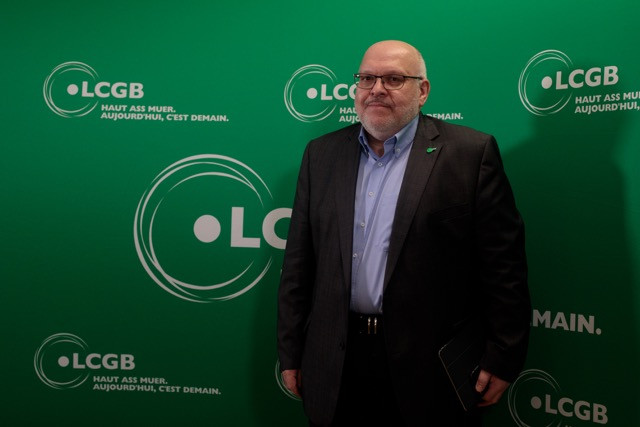LCGB president Patrick Dury will address his members via livestream on the union’s website and Facebook page at 11am on 1 May. The traditional celebrations for International Workers' Day have had to be cancelled because of the current confinement regulations. The union’s 42,000 members have all been affected by the coronavirus lockdown in some way or another. “All sectors have been impacted,” Dury said in a telephone interview on 29 April. “Obviously those in the health and care sectors have had to make an enormous effort to maintain the care of patients and the elderly. But logistics and commerce sectors have also been impacted--we all remember the panic buying at the start of the confinement.” Workers in the industrial sector have also been placed on short-time working as demand for products has dropped away, says Dury.
The LCGB president remains diplomatic when asked what he thinks of the government’s strategy in handling the crisis. “It is difficult to judge,” he says. “You have to listen to the experts.” But he stresses that the LCGB has always prioritised the health and subsistence of its members. “This has been a health and an economic crisis,” he explains.
The LCGB itself had to cancel its annual general meeting in March and has now decided to postpone the assembly for a whole year, until March 2021. As soon as the confinement regulations came into effect, the union closed its headquarters to the public and moved to teleworking. Some staff have now been recalled to work, but are wearing masks and using disinfectant. Physical meetings are being held in large conference rooms that allow participants to respect social distancing measures. Plexiglass has been installed in reception areas. “We will eventually open to the public again, but we are awaiting government advice on this,” says Dury.
The union has consulted closely with employers’ association representatives and Dury was on site when the construction industry started up again on 20 April to ensure that LCGB members were receiving adequate personal protection equipment. He says the return to work went smoothly. “But our members have the right to refuse to work if they feel their health and safety is being put at risk. If there are problems, we can call in the ITM [work safety inspectorate]”.
Dury is not keen to make any prognosis on when working in Luxembourg will return to any sort of normality. But he does have some demands for the government, including extending the short time working scheme well beyond the end of confinement to allow businesses to start up again slowly. “We have to have the same dialogue that we had in the 70s and 80s,” Dury says, referring to the so-called Luxembourg model of tripartite cooperation between government, employers and trade unions that helped the grand duchy survive, and later thrive, the steel crisis. He suggests investing in more public projects to help limit unemployment, and also wants workers facing financial difficulty to receive help accessing personal loans.
But Dury’s main criticism is reserved for the European Union. The crisis has shown it needs to be strengthened, he says. The closure of borders not only didn’t work in slowing down the spread of the virus he claims, it was also not a good show of unity. And the crisis also served to strengthen Dury’s belief that globalisation has maybe gone too far. “We need to bring manufacturing back to Europe,” he said. Face masks and so on must be made in the European Union. “There needs to be an enormous effort to maintain the economy and secure workplaces. And that needs to be done between member states, not just on a national level.”
